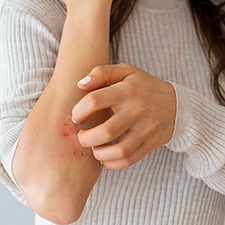Article
High Prevalence of Pruritus Recorded in Patients with Psoriasis
Author(s):
Investigators suggested that antipruritic therapies be offered to patients with psoriasis, as most psoriasis therapies did not result in any improvements.

A new tri-national study found pruritus to be highly prevalent in patients with psoriasis, with many psoriasis therapies being deemed “insufficient” for controlling the disease.
Given the prevalence of pruritus in these patients and the added burden it presented, investigators suggested that antipruritic therapies be offered to patients with psoriasis.
Investigators led by Tomasz Hawro, MD, from the Department of Dermatology, Allergology and Venereology at the University Medical Center Schleswig-Holstein in Germany, suggested that previous research had largely underestimated the prevalence of pruritus in psoriasis, with high prevalence and severe burden neing recognized mainly within the past 20 years.
As such, the details regarding clinical characteristics of pruritus in psoriasis have been loosely defined, which prompted Hawro and colleagues to investigate the effect pruritus had on patients’ quality of life, and the possible links to depression, anxiety, sex life, and suicidal thoughts.
The Methods
From November 2015 to August 2017, adult patients were recruited from in- and out-patient clinics and tertiary care centers across Germany, Poland, and Russia. Those with dermatologist-diagnosed psoriasis with psoriatic lesions who did not have active psoriatic arthritis were included in the study.
Age and gender-matched control subjects were also recruited.
A total of 634 patients were enrolled in the study, 356 of whom were male and all of whom were interviewed and examined by physicians prior to completing a self-reported questionnaire.
Among these patients, 568 patients and 246 controls completed their questionnaires. The mean age was 46, and median psoriasis severity was mild. However, 34.9% of patients had moderate to severe disease severity.
The Findings
Investigators found that a majority of patients (82%) had experienced pruritus throughout their disease, with 75% experiencing current pruritus. Among those who reported having pruritus throughout their disease, 56.7% stated that they experienced it daily, and the average and maximum intensities of current pruritus were mild to moderate.
Meanwhile, the median body surface of pruritus areas was 7.5%, according to a digital BSA of the condition.
Though most patients reported the scalp as the location of their pruritus, the body surface area of pruritus was not linked to intensity but rather to the BSA of psoriatic lesions (P<0.001).
Investigators also noted that 31% of affected patients reported impaired sex-life, while 4% reported suicidal ideations due to pruritus. Notably, therapeutic options for psoriasis provided no solution for one-third of patients, though antihistamines did appear to be effective in most cases.
Notably, the assessment of antipruritic efficacy of topical psoriasis therapies was based on self-reported responses by patients, and investigators suggested that future trials were needed to determine guidelines for “optimal and uniform” patient care.
"Importantly, psoriasis-specific therapies are frequently insufficient to control pruritusand oral antihistamines is the only antipruritic option offered to these patients," the team wrote. "Antipruritic therapies should be evaluated andunified and efficient optionsof antipruritic therapyshould be offered to patients whose pruritus does not improve under psoriasis therapy."
The study, "A comprehensive, tri-national, cross-sectional analysis of characteristics and impact of pruritus in psoriasis," was published online in the Journal of The European Academy of Dermatology.





